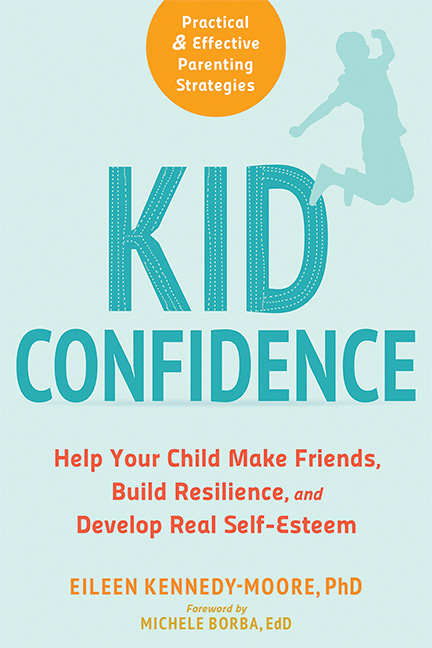(Would you rather read? A TRANSCRIPT is at the bottom of this post.)
Chloe’s friend doesn’t listen when she asks him to stop calling her names.
Scroll down for some DISCUSSION QUESTIONS you can share with your child, plus how to submit your child’s question.
Would YOUR kid enjoy being featured on the podcast?
Adults, please use your smartphone's memo function or an audio app to record your child's question. Hold the phone close to your child's mouth to make sure the recording is clear. Have your child state:
1) their FIRST NAME (or another first name),
2) their AGE, and
3) a BRIEF QUESTION or concern about friendship. (Please do not include any friends' names.)
Email the audio file to DrF@EileenKennedyMoore.com. I’ll answer as many questions as I can. (Obviously, this is not psychotherapy, and it’s not for emergency situations.)
Featured Book and Webinar:
Kid Confidence: Help Your Child Make Friends, Build Resilience, and Develop Real Self-Esteem
Real self-esteem isn’t about loving ourselves. It’s about being able to let go of the question “Am I good enough?” by connecting with something bigger than ourselves.
Topics include: feeling friendless, giving up easily, overreacting to criticism, or being different.
“This one is a game changer.”
— Dawn Huebner, PhD, author, Outsmarting Worry
BUY THE BOOK NOW: Amazon B&N Bookshop
Think About It Questions to discuss with your child
Have you ever been called names you didn’t like? What happened? How did you handle it?
Why is it important to stop when a friend asks us to stop? What are some reasons why kids sometimes don’t stop when asked?
Dr. Friendtastic mentioned communicating about your communication by describing the pattern you see and asking what’s going on. Why might this be a helpful thing to do in a friendship? (Hint: Why is it useful to describe the pattern? Why is it useful to ask what’s going on?")
What does this statement mean: “How you think affects how you feel”?
Transcript
Hi, there. I’m Dr. Eileen Kennedy-Moore, also known as Dr. Friendtastic. I’m an author and clinical psychologist based in Princeton, NJ.
Here’s today’s question:
Hello, my name is Chloe, and I'm 9 years old, and I have this friend in school that keeps on calling me names. What should I do because he's making me really upset?
Hi, Chloe! Thank you for sending in this question! That sounds like a very frustrating situation! I imagine you’ve asked your friend to stop a bunch of times, but he’s not listening. He’s probably trying to be funny or playful, but when he doesn’t listen to your requests that he stop, it seems like he doesn’t care about you. That’s hurtful!
So, this is a good example of why it’s so important to stop when a friend asks us to stop.
But what can you do in this situation? You said that he’s a friend, so I’m assuming there’s some caring and connection between the two of you, and you want to work things out, even though right now you’re upset about the name-calling.
One possibility is you could communicate with him about your communication. In other words, instead of responding to whatever he just said, you could talk about the overall pattern in what you say to each other.
For instance, you could say, “I’ve noticed you keep calling me that, even though I’ve asked you to stop a bunch of times. What’s going on?”
Describing the pattern you see and asking what’s going on might make your friend stop for a moment to think about what he’s doing and how it’s affecting your friendship. To you, it’s obvious that all the times he’s called you names are connected, but he may see those as separate events and not realize that there’s a pattern.
Asking what’s going on might also give you some useful information. We don’t know why he’s ignoring your requests to stop. Maybe he’s upset about something you’re doing that you don’t realize bothers him.
Communicating about how you’re communicating can help the two of you understand each other better.
There’s one other topic I want to touch on: You said, “He’s making me really upset.” The truth is no one can make us feel a certain way. You don’t like the name-calling–I can understand that!–but how you think about it affects how you feel.
If you tell yourself, “This is terrible! I can’t stand it!” you’re going to feel upset.
The opposite of that isn’t saying “This is great! I loved being called names!” because, of course, you don’t! Lying to yourself isn’t going to help. But you could say to yourself something like: “I don’t like this, but I can handle it,” or “It’s just a silly name. I know it’s not true,” or “He has a goofy sense of humor. It’s annoying but not a big deal.”
In all of those examples you’re recognizing that you don’t like the name-calling, but you’re also seeing that you’re strong enough to handle it.
With that in mind, you might choose just to step over the name-calling by changing the subject to something more interesting. Or you might say calmly, “I don’t like it when you call me that,” and if he continues, walk away for a bit and try again later.
This has been Kids Ask Dr. Friendtastic. If you have a question about making and keeping friends that you’d like me to answer, go to DrFriendtastic.com, and click on the podcast tab to see how to submit your question.
And be sure to check out my funny and practical books for kids about friendship: Growing Friendships: A Kids’ Guide to Making and Keeping Friends, and my new book, Growing Feelings: A Kids’ Guide to Dealing with Emotions About Friends and Other Kids. They’re available through your library or wherever you buy books.












Share this post